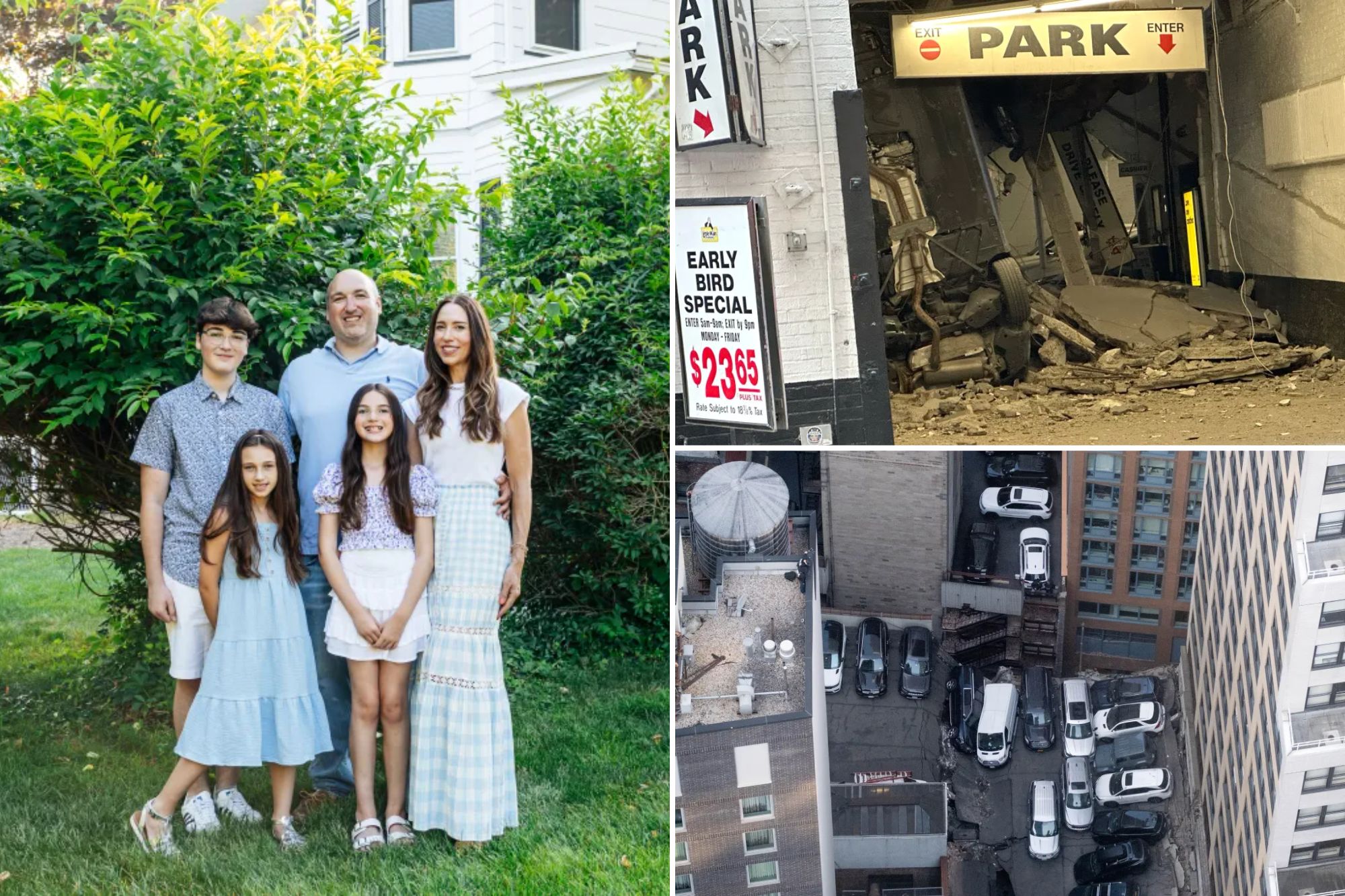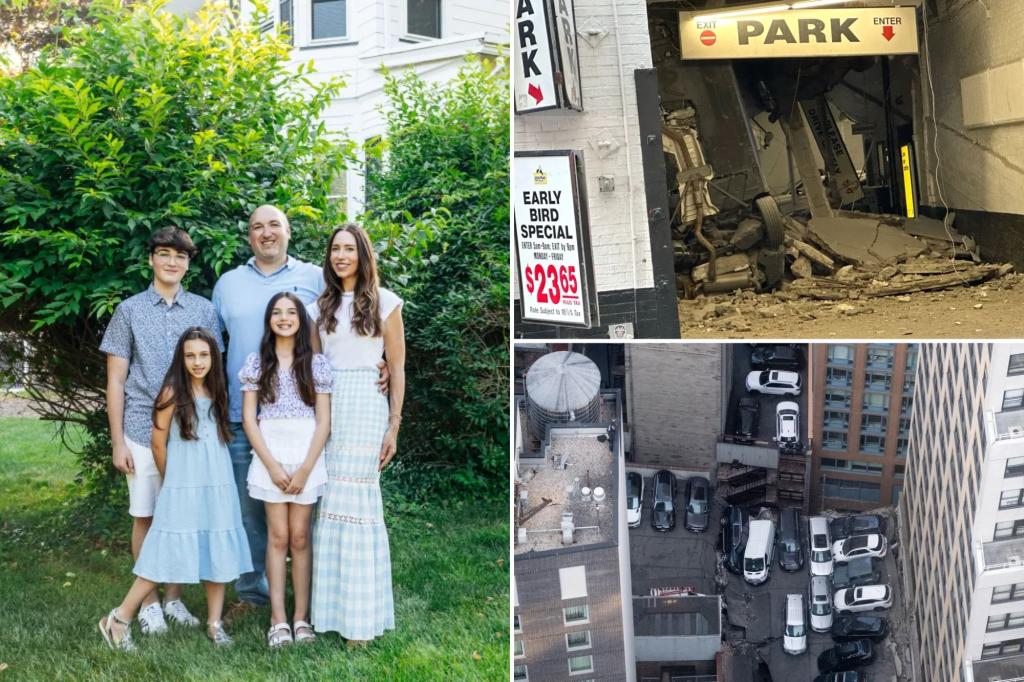
Just back from a family holiday in England, Suzanne Cohen was still unpacking – when she heard an earth-shattering boom.
Then came the screeching sirens. She ran downstairs. “It seemed like every cop and fire truck in New York was there,” she told The Post.
Her family of five lived near the Ann Street garage, which collapsed just over a year ago.
Their lives were turned upside down, as they were forced to leave their home indefinitely. The saving grace was that their possessions – apart from their car – were destroyed.
“I can’t even explain the feeling, thinking you could have had a building fall on you,” said Suzanne, a freelance photographer who also blogs at Gotham Love.
‘Tough People of New York’
When the family moved to Fidi a dozen years ago, the neighborhood was primarily a business district. Taxis were scarce, as were weekend trains. With three growing children, their Pathfinder – parked next door – made it easy to visit relatives in the suburbs.
The family shared their 1,400-square-foot loft space with a bathroom with temporary walls. The girls shared a room with bunk beds, and their teenage son had “the equivalent of a closet in the ‘burbs,” Adam said. “It was cozy to say the least, but we were tough New Yorkers.” Their monthly rent ended up at $5,200.
Five people were injured in the collapse. The garage manager, 59-year-old Willis Moore, whose daughter was an NYPD officer who was pregnant at the time of the collapse, was killed.
“This is a guy I used to know,” said Adam, a pioneering father blogger known as Dada Rocks, who works in marketing for a nonprofit, with concern. “We would joke; we talked about our children.”
The Cohens’ 12-unit building was served with an immediate eviction order, displacing Suzanne and Adam, both in their 40s, and their two children.
The Red Cross, which helps people immediately after a disaster, offered two nights in a remote hotel. “It wasn’t helping me get the kids to school the next day,” Adam said. (Red Cross assistance depends on individual circumstances, needs and resources, a spokesperson told The Post.)
After that, the family could go to a city shelter.
Instead, they opted for a few days at a downtown hotel and then met up with a relative in Westchester.
They left for school at 6 a.m. Adam would drop Marc, now 15, at middle school, then take Harper, 11, and Harlow, 8, to their school downtown . “If we left five minutes late, we’d hit traffic and miss the morning bell,” he said.
‘Innuendo and Gossip’
When the school year ended, the kids went to camp and the Cohens returned to their downtown hotel. The word was, always, that they could come home for another two weeks.
“Nobody in any authority said: Here’s the timeline and the actual plan,” Adam said. “It was all innuendo and hearsay.”
The most frustrating part, he said, was that their neighbors in the front apartments, just across the hall, were allowed to return after two weeks.
The garage, now completely leveled, was an L-shaped building — and the rear apartments were “directly adjacent to the collapsed building,” said Andrew Rudansky, a Department of Buildings spokesman. He later added that the cause of the collapse remains under active investigation by the DOB, along with its law enforcement partners.
The release order was finally lifted last November, seven months later, after the DOB received a structural stability engineering report for the rear of the building.
Meanwhile, unmoored, the Cohens struggled. “We had bar every night, we had hotel bills, we were living like tourists,” Adam said. They had limited access to their possessions. One sad summer day, he had to pick a suit for his mother’s funeral.
“The police were guarding the door and we had to ask them to come in,” he said. “Some said ‘OK’, some said ‘it’s none of my business’, some said ‘get someone from the fire department’.”
The family didn’t have renter’s insurance, but it wouldn’t have helped. Typically, impending collapse and cheap orders are not covered risks, said Celia Santana, CEO of Personal Risk Management Solutions.
“Most renters policies cover direct physical damage,” she said, such as from fire or theft, and not additional living expenses from loss of use due to an excluded peril.
The family car, however, was quickly replaced by insurance.
A new beginning
As the school year approached, the Cohens knew they couldn’t wait any longer. “I had to pull the cord,” Adam said. City rents were expensive and small. They prepared to move down to the suburbs, as some friends had done during COVID.
They settled on Westfield, NJ, a walkable town with good schools, commuting to the city. Finding little inventory and stiff competition, they rented a house for a year for $4,900 a month and began the search for a permanent home.
Finally they found it—a 1902 charmer with a screened-in porch and a Japanese maple. Inside, the 2,100 square feet included four bedrooms, a loft and two bathrooms. The seller’s family had owned it for 50 years. The Cohens offered $975,000 with an asking price of $950,000.
The price dropped to $945,000 after the inspection, which revealed problems, but not their extent. The ancient roof, rusted sewer pipe, knob-and-tube wiring – all needed replacement. The Cohens closed in mid-April, almost exactly a year since the collapse.
They are planning to occupy their new home during renovations once their lease is up.
“I have a vision of what this house will look like when we’re done with it,” Adam said. “I’m only $100,000 short. I could write a book about the things I didn’t know a year ago.”
Meanwhile, they are reshaping their lives as suburbanites.
Children love having their own rooms and a yard. However, “the kids’ favorite part is the big kitchen where they can come down and hang out,” Suzanne said.
The family used to order household products online. Now they drive to Target. They bought a barbecue grill. They threw leaves. They won Halloween decorations, now mandatory.
For Adam, commuting more than an hour to his office near Columbus Circle five days a week is a strain. New Jersey Transit is far less reliable than expected. One miserable day, the journey home took 3 hours.
The constant uncertainty was exhausting and there was no good solution for a middle-class family of five suddenly evicted from their home, he said.
“There was no safety net. My wife saw the cracks in my New York armor. I wonder: How did the last few years of my life go so far off the rails? There are a lot of emotions to unpack.”
Meanwhile, the girls love their new school. Their son will soon get his learner’s permit. They all agree that having more than one bathroom is life-changing.
“For the most part,” Adam said, “it’s about keeping smiles on my kids’ faces.”
#Life #Ann #Street #garage #collapse
Image Source : nypost.com
